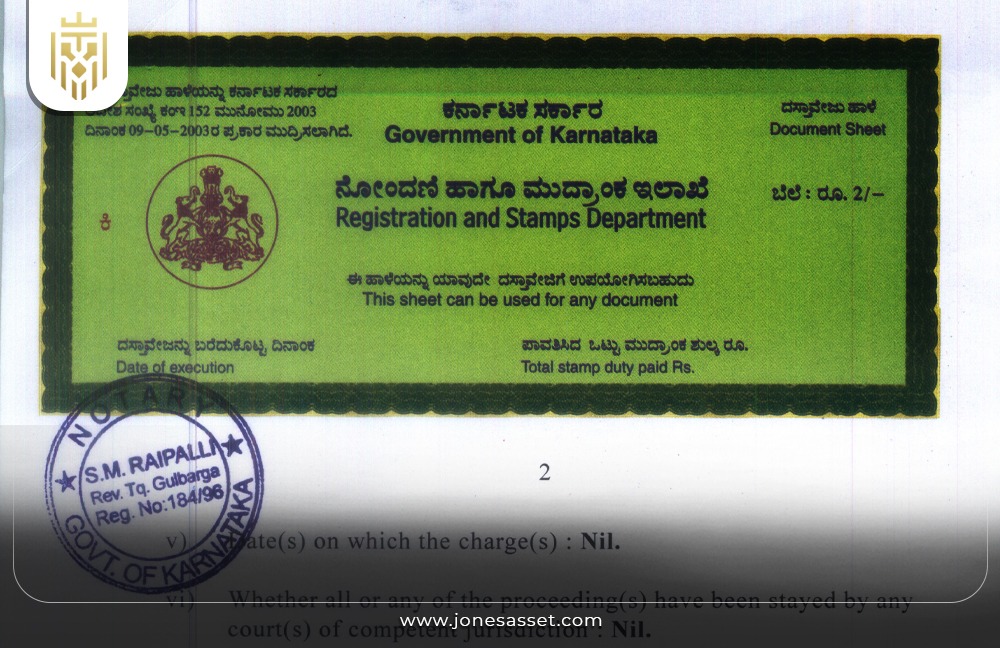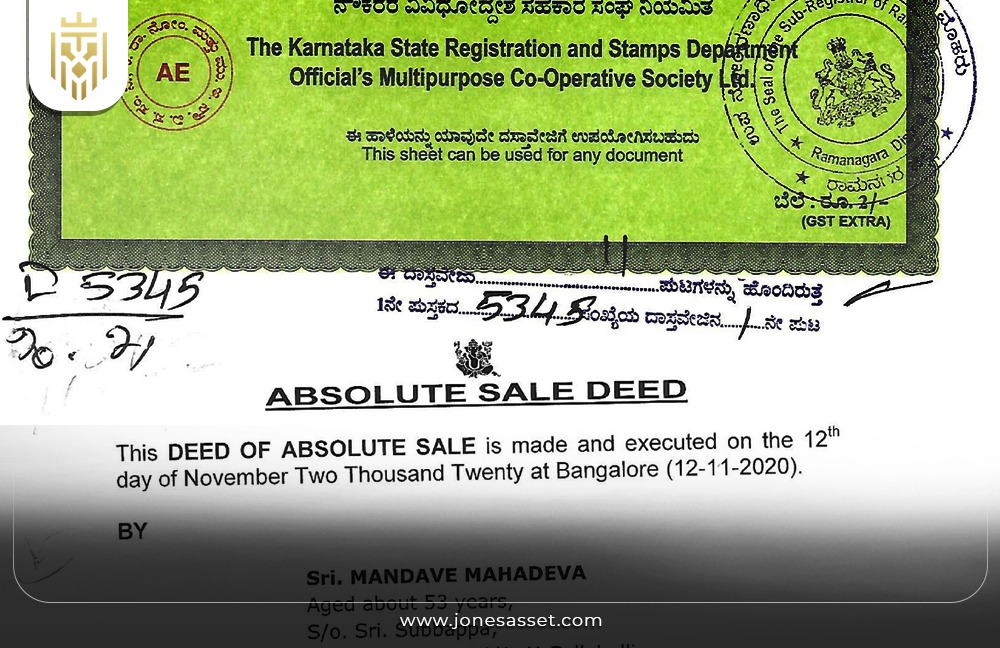What is Sale Deed:
A Sale Deed is an authorized note that demonstrates the change of ownership of a piece of land or House from a vendor to a purchaser. Basic information is also incorporated in the document and it covers the general description of the property, sale price, terms of payment, and the buyer and seller. It should be written on non-judicial stamp paper, with the consent of both parties, and properly attested and registered before the Sub-Registrar to be valid under Indian laws.
Importance of a Sale Deed:
The Sale Deed is also important as it ensures that the property has been sold in the eyes of the law. It intervenes in the process of making a deal and regulates the relationships between the buyer and the seller. The Sale Deed registration formalises the transaction making it less likely to have problems later on in the form of a dispute or a claim to the property.
Legal Validity:
On the legal requirements for a sale deed in India, it has to be made on the appropriate stamp paper with the intention of both parties and it has to be witnessed. After that, it has to be presented to the concerned Sub-Registrars office. This registration of the property is useful to afford legal acknowledgment for transferring properties and also to minimize various fraud cases.
Proof of Ownership:
A registered Sale Deed gives the buyer conclusive evidence, therefore, of the property’s transfer. This transaction assigns the legal ownership of the property from the seller to the buyer, thereby making the buyer the legal owner of the property. This document would be helpful for any future transactions that might occur on the property like when it is sold or passed on to another person’s generation.
Property Title:
The Sale Deed is imperative to determine an absolute and marketable track record. It gives an account of the property and its legal issues; it establishes that there are no third-party claims over the property or other issues. A clear title represents one’s ability to obtain loans, sell the property, or any legal action if needed in the future.
Avoiding Frauds:
A registered Sale Deed is useful because it protects against property fraud by documenting the sale legally. It helps to make sure that the property that is being sold has no legal issues associated with it. The buyers should search for the Sale Deed and other similar documents to be in a position to confirm whether the seller legally owns the property.
Access to Public Records:
When a Sale Deed is registered, it becomes registrable and part of the records that are open to the public. Public records can be accessed with this record to check on the previous owners of the property for credibility and legal purposes. This assists in verifying that the property is free from any encumbrances and that the transfer was legal.
Sale Deed Registration:
Sale Deed registration is the formal registration of conveyance of the immovable property that has changed its ownership. This entails the preparation of the Sale Deed on the non-judicial stamp paper and attesting it through the signatures of both parties accompanied by witness signatures next to them. Registration affords legal proof to the transaction by enregistering it in government records to curb transactional infections such as disputes and fraud.
Documents for Sale Deed registration:
For Sale Deed registration, the following documents are required: the Sale Deed, prior Sale Deeds if any, Encumbrance Certificate related to the property, identity proofs with photographs and signatures of buyer and seller, receipt of stamp duty, receipt of registration fee, and no objection certificate if required.
Chain of Title:
The chain of title is a legal term that defines the stream of documents that reveal the transfer of the property from one owner to the next. It helps in confirming when the property was transferred to the current or previous owner, to check for any encumbrances or litigation pending against it. Possession is another key factor that has to do with the title and plays a major role in proving the claim to the property and making the property marketable.
Registered Agreement to Sell:
A Registered Agreement to Sell is a preliminary document that sets out certain terms and conditions contained within a future sale of the property. It is done through the Sub-Registrar and contains aspects like the selling price, monetary considerations, and timeframe. It shields the two parties until a sale deed is signed to minimize the losses that may occur.
Sales Deed Document:
The Sales Deed Document is the document that acts as the legal disposition that records the transfer from the property seller to the buyer. They contain detailed information on the property, the parties, the sale consideration, and other term regarding the sale. Upon execution and registration, this document becomes the legal instrument that evidences title to ownership.
Proof of Stamp Duty Payment:
A stamp duty paid receipt is a legal document that proves the buyer has remitted the necessary amount of stamp duty to cover the property transaction. Stamp duty is another government’s monetary charge for a property transfer as per an agreement of sale, and it is compulsory to pay for an effective statute of sale from the Sale Deed.
Proof of Registration Fee Payment:
Receipt of registration fee means a receipt issued to a person towards the amount which is paid to the Sub-Registrar towards the registration of the Sale Deed. This fee is required to work in tandem with the government records in recording the property change of ownership to ensure legal recognition of the new owner.
Proof of TDS Payment:
TDS proof is an acknowledgment submitted to the buyer which proves that the tax amount deducted from the property purchase has been paid to the Income Tax Department. In the case of house transfers, if the value of property is over ₹50 lakh, the buyer is required to deduct one percent TDS and e-file it using Form 26QB.
Approved Building Plan:
An approved building plan refers to the approved plan that is legal and authenticated by the local municipal authority of a particular property as to the design of the building as well as other features that the plan may contain. It keeps the construction legal and within the code, set-backs, and required permits, as well as helps in acquiring financing and avoiding legal matters.
Loan Documents:
The sanction letter, the loan agreement, and the other loan details provided by the lenders constitute the loan document. These are docket the agreements of the loan, the mode and structure of paying back the loan, the interest rate, and any further information regarding the loan. It is crucial to check the legal requirements for the funds used to buy the property.
NOC from the Electricity Department:
Permission letter from the electricity department in the format of a No Objection Certificate (NOC) ensures the prima facia evidence to testify that there are no outstanding electricity bills in the respective property. Thus, this document provides safeguards for the buyer so that they will not have any liabilities and be able to take over the electricity connection seamlessly.
NOC from Pollution Control Board:
An NOC from the board indicates that the property, which is intended for the establishment of these facilities, meets environmental standards and requirements. Hence for facilities in industrial or sensitive areas, it is important most especially that they are not in violation of pollution control laws.
NOC from the Water Works Department:
A signed letter from the Water Works Department confirms that there’s no balance in the water bill and that the property complies with the set water supply regulatory standards. This saves the buyer some hustle as they can obtain the title to the water connection and be served with water as required.
Share Certificate:
Finally, in the case of a cooperative housing society, a Share Certificate must be handed over to the buyer which shows that the buyer is an owner and a member of the society. This is another legal document which formally formally confirms the buyer’s right to the property and the rights in society.
No Objection Certificate from RWA:
Practical evidence occurs when the status of a homeowner is free from any cases of dues or other infringements against the Resident Welfare Association (RWA) No objection certificate. Because the RWA membership involves some shares in property, this certificate is vital in the transfer of property and RWA membership for the buyer.
Identify Proof of Buyer, Seller, and Witnesses:
The buyer and the seller as well as persons attesting to the deal must possess proof of identity, including Aadhaar, PAN, passport, or voter ID. These come in handy in proving the identities of the parties involved in the property transaction hence the legitimacy of the transactions.
Address Proof of Buyer, Seller and Witnesses:
For the buyer, seller, and witness, address proof documents like Utility bills, Aadhaar, voter ID, and passport are required. These are important documents that affirm the residence of the parties involved as stipulated in the formal records and which are useful in correspondence involving the property deal.
How to get a certified copy of the sale deed?
To get a certified copy of the sale deed, one has to approach the sub-registrar where the deed has been registered. You are required to fill in a form and provide the necessary information including the details of the property, registration number, and date of registration. After ascertaining the records, the office will produce a certified copy of the document upon payment of the stipulated fee.
How to get a certified copy of the sale deed online?
In some of the states, you can get a certified copy of the Sale Deed through the state’s website of land records or registration department. Go to the website, enter the property registration number, year, Sub-Registrar’s office, etc. Make the required payment online. Thus, after processing, it is possible to download the certified copy through the portal.
What are the benefits of a sale deed?
A Sale Deed provides several benefits: it legally conveys the property to the buyer and is considered conclusive evidence of ownership to the buyer. It spells out the agreement of the sale and covers all relevant aspects to safeguard the buyer and the seller. The registration of the Sale Deed makes the transaction official and registered within the government records, which can help avoid future conflicts or frauds. It also assists in the acquisition of loans and makes the subsequent transactions involving the property less complex.
FAQs
1. What is a sale deed?
A Sale Deed is a legal document that originated and is agreed upon between the seller and the buyer of the property. It gives details such as the description of the property, the price at which it’s being sold, and the mode of sale among other factors.
2. What are the benefits of a sale deed?
The advantages of including a Sale Deed are: the property ownership can be legally transferred; the property owner can provide legal documentation of ownership; the sale and the buyer’s and seller’s interest are safe; the future transactions of property can easily take place; and the government records of the transaction can be recorded.
3. What are the documents for sale deed registration?
Documents required for deed registration: A Sale Deed that is original and has other Sale Deeds that are earlier ones along with printed and non-printed copies of the Encumbrance Certificate, and other vital documents including ID proofs of the buyer and the seller, receipts of Stamp duty and registration fees and also a No Objection Certificate if it is necessary.
4. How to get a sale deed copy online?
To obtain the Sale Deed copy online one has to go to the state-wise land records or registration department of the concerned state, give the property details, Pay the necessary fee for the certified copy, and get the certified copy after preparing.





